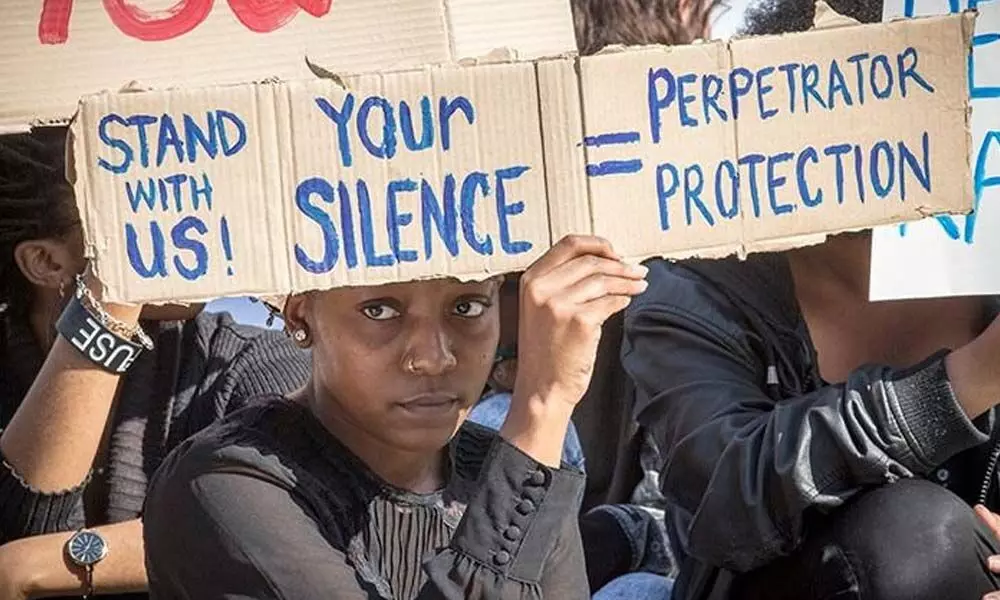Still a one-sided battle for women

Still a one-sided battle for women
India is a male- dominated society in which social, economic, cultural, political and religious institutions are mainly controlled by men
India is a male- dominated society in which social, economic, cultural, political and religious institutions are mainly controlled by men. This control over women's livelihood choices and sexuality has existed and evolved over centuries through various discriminatory social practices. A combination of family, caste, community and religion reinforce and legitimise these patriarchal values.
Stereotyping of women and their roles continues in public and private institutions. Discriminatory practices such as child marriage (though has come down), dowry, honour killing and gender-biased sex selection indicate profound vulnerability of, and inequality towards, girls and women in Indian society. Child marriage is a denial of childhood, especially for girls. Dowry devalues women. Gender-based sex selection eliminates girls from families and societies, altering the social fabric. Honour killing is a barbaric violation and humiliation of girls and women.
This paradoxical situation of women in India is alarming. On the one hand they are worshipped as goddesses, while on the other burnt for dowry. Boys are more desirable and seen as a support for parents in their old age and as necessary to continue the family lineage. Girls are considered an unwanted burden yet support their brothers and men and suffer in silence atrocities such as abuse, violence, rape and early marriages. If they break their silence, the repercussions are unimaginable.
Some of the major issues/problems being faced by Indian women, may be in several other countries around the world. I am giving a brief mention of a few major problems faced by women. Domestic violence is one of the major problems being faced by the women. Physical violence is the most common in addition to mental, economic and sexual. For the protection of women from domestic violence, Domestic Violence Act has been enacted during 2005. But even after a decade and half the assurances made in the Act have not been decimated, due to various reasons.
To my mind , one of the reasons could be, in a country like ours where the marital home is the only abode considered right for women - even if it is a very dangerous place , and where even natal families do not welcome women, looking to leave their marital homes, women cannot hope to escape violence unless alternate safe shelters exist.
Interestingly, according to a survey, globally, including India, women faced more domestic violence during lockdown. It shows that domestic violence has been ever-present pandemic which was exacerbated during lockdown, may be due to rising frustrations, insecurities of jobs, wage losses, increased burden of care work, lack of mobility and social contact. Looking at all these aspects, it is high time that the government prioritises Domestic Violence Act for redressal of grievances of the women across the country.
According to National Sample Survey, 2017-18, the Periodic Labour Force - refers to economically active individuals who supply or seek to supply labour for production, which include employed or unemployed, women's participation in paid work has been declining over the last 25 years, whereas men's labour force participation rate has been higher than women. This means that women's involvement in paid work remains low, a challenge to India. Increased participation of women in paid work has larger ramifications. In South Korea and Bangladesh, rise in labour force participation contributed substantially to a lowering of the preference for a male child, though trend is changing in India as girls are seen to be more caring and provide old age support than boys. As per one survey, globally women are dropping out of the labour force than men and India is no exception.
In India women bear disproportionately high burden of unpaid domestic and care works. As per all India Time Use Survey 2019, 81 per cent females and 26 per cent males participate in unpaid domestic work in the country. The similar disparity persists in the average time spent per day, females and males in India spend 299 and 97 minutes respectively. The data suggests that the females bear more than 83 per cent of the burden of domestic and care works in India. There is a proposal by one of the regional parties in ongoing elections, as paying wages to women for unpaid domestic and care work.
There are two important aspects about it; One, it is well known that women predominantly carry out unpaid domestic and care activities, often at the cost of their employment prospects and health. The monetary reward is a recognition of their contribution to the well-being of the household and the opportunities foregone by them. The proposal of the party will not in the right spirit, because paying monetary benefits will endorse that these activities are meant for women and they are paid for, men can claim that women are bound to do these activities and men will not participate in these activities at all, giving more burden to women.
Second, the economists suggest that the government should recognize this unpaid work by carrying out proper survey and use the data in national policies. If GDP is a measure of total production and consumer of the economy, the household produces goods and services for its members, this work has to be incorporated by accepting household as a sector of the economy. The unpaid work needs to be integrated with the mainstream economic policies and it could be an important economic sector.
The lives of women across the world have improved for the better but their struggle for equality still continues. In 2018, as per UNDP, India's Human Development Index ranking is not satisfactory because 27 per cent value was lost on account of gender inequality. Women overall received lower- quality medical care than men. Improving health outcomes for women in India necessitates a life-long approach towards managing their health needs.
Women lack religious freedom. In a study by Georgetown University and Brigham Young University researchers were able to connect religious intolerance with women's ability to participate in the economy. When there is more religious freedom an economy becomes more stable because of women's participation.
According to the World Bank, over one billion women don't have legal protection against domestic, workplace, public, unwilling sexual violence in addition to domestic economic violence around the world. In India, according to the agricultural census, 73 per cent of the women are in agriculture sector - informal sector and 10 per cent are in formal sector. At work place they face all types of harassment/violence, but they don't report due to fear of losing jobs. Instead of legal justice, there are instances in our country, where High Court is asking molester to tie rakhi to the victim and Supreme Court is asking rapist to marry the victim.
In India , for eliminating gender inequality, there is need to make all existing unequal laws gender-equal, we need more than women's movement, there is necessity for change in mindset of the society as a whole about women, more women representation in public life and policy making at national and states levels, not only for the betterment of women but for an egalitarian society and also for a stronger economy in the world.
(The author is a retired IFS officer)










